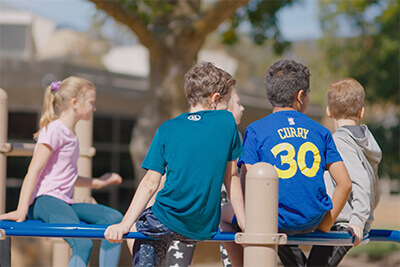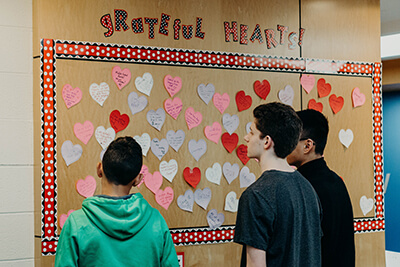March 13, 2020
 MPA has created this page to keep the community updated on the latest information related to COVID-19. Please check back here as needed, but know that additional updates will be emailed as well.
MPA has created this page to keep the community updated on the latest information related to COVID-19. Please check back here as needed, but know that additional updates will be emailed as well.
Current Status | Updated April 23
- Due to COVID-19, MPA’s campus is closed for the rest of the academic year.
- Classes PreK-12 will be in session virtually.
- During this time there will be no on-campus school events, activities, athletics, or childcare at MPA.
MPA Resources
External Resources
Need childcare?
District 622 (North St. Paul-Maplewood-Oakdale) is providing free childcare to the students of healthcare and government workers who are preschool age through grade five and attend a school in District 622, including MPA. A list of approved occupations can be found here. Sign up here. If you have any questions, please email Kurt New or call 651-748-7634.
Questions
Virtual Learning Extended And Refined: A Message From Dr. Bill Hudson, Head of School
April 23, 2020
With the health and safety of all members of our community in mind, and in keeping with our commitment to follow the recommendation of the Governor and public health officials, I can now confirm that MPA will remain in virtual school through the end of the school year. This wasn’t an easy decision, as you might imagine. However, it is clear that it is not possible to return to on-campus school while maintaining the necessary social distancing and safety standards. I believe MPA is positioned to successfully navigate this crisis and emerge better and stronger than before. The strength of our community, the durable relationships we enjoy, our dedicated and exceptional faculty and staff, and our history, mission, and values will power us through what lies ahead.
Virtual School
As I said in the beginning, “first different, then better.” Modeling the resiliency we inspire in our students, we have been engaged in an ongoing process of designing, implementing, assessing, and adapting teaching and learning to meet the needs of our students. As we look ahead at the next eight weeks, modifications and refinements are necessary. The administration and faculty have taken to heart the advice of a seasoned head of school from New York City who successfully led his school in the aftermath of 9/11. He said that the ability to adapt is more important than the plan itself. I am so proud of our teachers for continuing to grow and evolve in this new environment.
It is now abundantly clear that we are in a marathon, not a sprint. With the knowledge that we will not return on campus this academic year, we have reimagined what an end of the school year will look like with the academic, social, emotional, physical, and mental health of our community at the forefront. Several changes are will go into effect on Monday, May 4 that are designed to continue to engage and motivate students as the novelty of virtual school wears off and fatigue sets in.
Academically, teachers are adapting curricula, assessing in-class work and homework, and rethinking assessments and grading. Flexibility, compassion, and empathy are guiding how we provide feedback, assess, and grade. Teachers are working to strike the right balance between synchronous and asynchronous learning. Just as each student learns differently, there is a wide variety of teaching. Teacher autonomy matters at MPA and no two days look exactly alike.
Each division has created a unique iteration of the weekly schedule and educational program that will go into effect on Monday, May 4. Our collective work has been guided by feedback from parents, students, and faculty as well as research on distance learning and best practices. Modifications look different across divisions as we take into account the unique learning needs and developmental age of students. However, a clear set of common values have guided the development of the plan of each division:
- Model a growth mindset that values iteration and ongoing improvement that builds resiliency.
- Preserve and advance the continuity of learning, rigor with purpose, and joyful learning.
- Promote ongoing innovation to creatively address new and emerging needs of students.
- Enrich student motivation and engagement.
- Foster the social connections and emotional health of our students.
- Further expand opportunities for individualized attention and group social interaction.
- Provide consistency of structure and routine.
An overview of changes to the weekly schedule and educational program of each division may be found online for Lower School, Middle School, and Upper School. Division directors will provide additional depth and detail in their weekly communications.
End of Year Celebrations
The end of the academic year is typically a very exciting and joyous time as we celebrate the accomplishments of our students. We are developing plans for these celebrations—some may be entirely new, some may be reimagined, and some may need to be postponed or cancelled. In particular, a taskforce of students, faculty, and administrators are working diligently to honor the accomplishments and contributions of the Class of 2020 in ways that are student-driven, meaningful, and joyful. There will be more information to come about how you may help and participate.
Summer Programs
At this time, summer programs are canceled in June. As we have with virtual school, we are re-imagining our summer programming and hope to begin offering classes and camps on campus Monday, July 6. We will share details as these creative and exciting opportunities are finalized.
In the midst of this crisis, there is much we do not know. Although we do not have all the answers about how severely this pandemic will or will not impact our society and our school, I want to share with you what I do know:
- We have a very strong, caring community.
- We have creative and dedicated faculty and staff.
- We have parents who consider teachers and staff to be partners.
- We have generous donors who believe in our mission and truly appreciate our faculty and staff.
- We will transcend this moment in time to discover and implement how our strengths can differentiate us in a new world context.
- We will emerge stronger as individuals and as a school community.
Previous Updates
Dear MPA Families,
I’m writing to let you know that we will follow the recommendation that Governor Walz made today and continue learning virtually until May 4. While this is not easy news to share, my primary concern is always with the health and safety of our community.
Please don’t miss Thursday’s Panther Post. I will share more thoughts about the transition to virtual learning and the extension announced today. In the issue, you will be provided with the first formal opportunity to provide feedback—we need that in order to provide the most exceptional experience possible for your children.
I hope that you will join the division directors in their upcoming Town Hall Meetings being held via Zoom today and tomorrow. See links below as reminders.
Please know that we’re here for you, we care deeply about you, and we will come through this stronger, more nimble, and more resilient than we’ve ever been before.
Sincerely,
Dr. Bill Hudson
Head of School
Lower School Town Hall Meeting
Wednesday, March 25
4-5 PM
Meeting ID:
546 476 498
Upper School Town Hall Meeting
Wednesday, March 25
7-8 PM
Meeting ID: 853 897 697
Password: 063088
Middle School Town Hall Meeting #2
Thursday, March 26
7-8 PM
Meeting ID: 332 737 0417
Parents Only, Please
First Different, Then Better
Many years ago, I learned an important lesson about change, be it societal, organizational, or educational: first different, then better. Most people want things to be better, but not different. In these extraordinary times we find ourselves in, everything is most certainly different. The education your students will experience starting next Tuesday is no exception. I am confident that the can-do spirit of Mounds Park Academy will endure and we will continue to offer meaningful, engaging, and substantive learning activities as we move to a virtual school model.
Great teachers are like conductors of an orchestra. They are attentive to the needs of and draw the best from each individual, but also blend together the various sounds into a magnificent whole. Great teachers employ a variety of methods and pedagogical techniques, intermingling a number of different activities in one class period. I’ve said it many times over the last few weeks that great teachers make great online teachers. This is because elements of virtual learning happen all the time as teachers regularly employ a variety of asynchronous, digital learning tools and activities. The difference is that we are now in a situation that virtual learning will take place for a sustained period of time.
In many ways, Tuesday will be like the first day of a new school year. It will take a few days to settle into the format and become accustomed to a new routine. Like the beginning of a new school year, it will be messy, and at times, frustrating. However, the positive attitude and flexible mindset we nurture in our students will carry us through the newness. The administration and teachers have worked tirelessly over the last several weeks, building and expanding upon our virtual learning foundation. Just as it is on campus, learning will be different across grades, divisions, and subject areas. The schedule will be different, and each day will vary with a variety of different learning opportunities. We will all need to be iterative, patient, and have realistic expectations. And, we will continue to honor the autonomy of individual teachers—that’s the MPA way.
The unique partnership between parents and school has long been a hallmark of an MPA education. In these times, we will need to rely upon this relationship more than ever and draw strength from it. Without question, parents will need to be engaged in their child’s learning but that will vary widely based on a student’s age, grade, and aptitude. We recognize that parents themselves are likely working from home and will make every effort to strike a balance between the appropriate level of guidance and support without it becoming another full-time job. Open, honest, and respectful communication will be essential, and I encourage you to reach out to teachers and administrators with your suggestions and concerns. Please also reach out with positive feedback—they are working really hard to serve your children in outstanding ways.
While these are certainly unprecedented times, when we emerge, we will see ourselves and one another in new ways. Disruption and discomfort are the enemies of complacency and can exponentially inspire and spur growth. Content knowledge is important but, as the world is reshaped in the foreseeable future, there will be opportunities to learn invaluable lessons about community, family, civic responsibility, and social health: central components of human life that are at the heart of education.
Relationships matter, perhaps now more than ever. We are fortunate to have a close, tight-knit community and have already formed, nurtured, and strengthened meaningful relationships. In the virtual world, we will continue to support social and emotional learning and be attentive to the mental health needs of students. Parents and teachers need to realize we are all human and need to practice self-care. Above all, we must be kind and forgiving—of yourself and others.
Sincerely,
Dr. Bill Hudson
Head of School
Dear MPA Community,
I am writing to you with sadness—sadness for all of the people in our world who are suffering, sadness for the healthcare workers and emergency personnel who are separated from their families, and sadness for all of the students of Minnesota who, for the foreseeable future, will not be able to attend school in the way they are accustomed March 18-27, at a minimum (see announcement from Governor Walz here).
That being said, has there ever been a better time for our school community to dig deep, stretch our capacity, and engage in the best distance learning environment possible? We will all come together, as Panthers, and be our best: our most innovative, our most engaging, our most creative, our most kind, and our most hopeful. Together, I have absolutely no doubt that we will emerge from these challenging times stronger than we were before, more connected and less afraid.
The administrative team has been working throughout spring break thus far for this possibility. Teachers, too, have used their break to begin formulating alternative lessons plans. However, in order to collaborate and finalize planning, faculty will gather at school on Monday, March 23. There will be no school that day, virtually or on campus. Through hard work, dedication, and the can-do spirit that our school was founded upon, we’ll be ready to start learning virtually next Tuesday, March 24. Governor Walz has closed schools March 18-27, however, we will be fully implemented and prepared should that date be extended.
Please note: Due to this order, Panther Club and Den will be closed starting this Wednesday, March 18. If you are unable to secure childcare and are a health care professional, first responder, or other emergency worker, please email gwallraff@moundsparkacademy.org. We are currently discussing ways we can accommodate the governor's request to provide care for those workers, should parents have difficulties securing an alternative.
Please send your thoughts and questions to communications@moundsparkacademy.org. FAQs will be posted below as they come in. And, I will plan to communicate again on Thursday.
I’ll close with an excerpt from our manifesto that is grounding me in the MPA way, and I hope will ground you too:
Your type of mind calls for our type of education. Education that awakens your senses. And encourages respectful discourse, at every turn. That unleashes a sense of wonder, a depth of inquiry, and a joy of learning. For a lifetime. That encourages you to explore your own unique differences, while insisting that everyone learns, lives, and thrives together. Grounding you in the radical idea that your identity in your world is not measured by a test score, but by the depth and decency of your impact on the world.
While nothing could ever replace the face-to-face experience that MPA typically provides, I pledge to you that our purpose as described above will not change. MPA’s faculty, staff, and administrative team will work tirelessly to ensure that.
Sincerely,
Dr. Bill Hudson
Head of School
Dear MPA Community,
Throughout spring break, members of the administrative team have been keeping a very close eye on developments related to COVID-19 and have continued to work diligently to keep the health, safety, and well-being of our entire community at the forefront of our decision making.
Given practices were scheduled to begin on Monday, we have made the difficult decision to suspend spring sports and extra-curricular activities indefinitely. This is similar to other IMAC conference schools. That being said, following the guidance from the Minnesota Department of Health released today, at this time we are planning to resume classes after spring break, on March 23. When your family returns, you will find that we have:
- Instituted a more extensive cleaning protocol in classrooms, common spaces, and offices.
- Added free-standing hand sanitizing stations throughout campus.
- Secured hand sanitizer for every classroom and office.
As I communicated prior to spring break, if you have traveled you will need to follow the protocols in place by the CDC prior to returning to campus, including any quarantines that may be required. If one person in your family needs to quarantine, all members of your family will be required to do so before returning to campus. In these cases, or should you decide to keep your student at home due to a pre-existing health condition or other risk factor, teachers will work closely with families to ensure that learning continues.
Next Thursday, I will communicate again with a full list of protocols and social distancing measures that will be in place when school resumes as well as a list of any gatherings that may need to be cancelled. And, should anything significant change between now and then, I will certainly communicate again.
If you have any questions, please do not hesitate to email communications@moundsparkacademy.org or reach out to your division director.
Dear MPA Community,
As we approach the official beginning of MPA’s spring break, I would like to provide another update before our community scatters for two weeks. Our planning and preparation to preserve the continuity of learning and minimizing educational and social disruption advances in scope and detail. Precautionary measures are continuing to be developed and implemented. All students have been educated about COVID-19 and proper hygiene is being emphasized and reinforced.
We continue to monitor global, national, health organizations as well as consult with local health officials in order to make the best possible decisions to keep our entire school community safe. The situation unfolds daily, sometimes hourly, and the Minnesota Department of Health anticipates that cases in Minnesota and the nation will increase. Many universities and corporations have halted international travel, and some have even cancelled all non-essential travel in the United States.
Out of an abundance of care and caution, I strongly urge all community members planning to travel over break (either domestically or internationally) to carefully watch and plan to follow the recommended U.S. State Department and Centers for Disease Control and Prevention (CDC) guidance on COVID-19. Please prepare for the possibility of rapidly changing travel restrictions that might prevent your family and child from coming back to school. Please take time to carefully weigh the potential risks to your health and the health of our community.
I want to say a few words about the matter of closing school. In short, MPA will follow the recommendations of national, state, or local health organizations. It could be that we face a government-imposed shutdown. Or, local health officials may mandate certain quarantine or exclusion rules in the face of an outbreak. Given that our community’s safety is paramount, we may decide to close school doors even without a government mandate. In our next communication, we will provide greater detail into how the decision is made. In the event that schools are closed during spring break, we will activate the school’s emergency notification system and contact parents and guardians by phone, text, and email, according to the contact information you have indicated in Powerschool.
If MPA closes for a period of time, we will ensure the continuity of learning by moving to virtual school. Great teachers make great online teachers. The strengths of our exceptional teachers are, in part, built on their ability to relate to students and create a true classroom community. That also carries over into the online classroom. The guidelines for the ongoing education of our students may be found here. Please take a moment to review the guidelines; if you have questions, please contact your division director. I hope there will be no disruption to school because of the virus, and that our preparations will serve only as a valuable exercise.
As I’ve learned more about the virus and come to understand how to prevent and proactively prepare for its spread, what we do know is that there is much that is not yet known. Therefore, we will continue monitoring this situation and provide updates as necessary. Please be assured that as we depart for spring break, the health and wellness of our community remains our top priority. I am grateful for the trust you place in us and the strong partnership that is a hallmark of MPA.
Dear MPA Families,
In addition to what I communicated in Panther Post last Thursday, I am writing to share additional information about MPA’s approach to the COVID-19. As a school community, MPA is focused on the possible impacts on our students, faculty, and staff—our primary concern is the safety of our entire community.
To ensure our sound and careful decision-making, we are monitoring global, world, and local health organizations including, but not limited to the Minnesota Department of Health, World Health Organization, CDC, and local governmental organizations. It is important to remember that handling the spread of a serious virus like COVID-19 is primarily a task for public health agencies. Additionally, we have assembled MPA’s Emergency Management Team to ensure we are informed and prepared.
As a school community, we have four goals: prioritize the health and safety of our community; preserve the continuity of essential services; minimize the educational and social disruptions; and minimize academic losses. To that end, as a PreK-12 faculty and staff, we have spent a great deal of time over the past few days diving deeply into the following:
- taking steps to keep our entire community healthy and safe;
- educating ourselves about COVID-19 and becoming more comfortable talking about the virus with our students; and
- planning for the continuity of learning and school operations should a temporary closure become necessary.
Below you will find an update on each area of focus.
Taking steps to keep our entire community healthy and safe.
We have ordered additional cleaning supplies and, in partnership with our facilities and evening cleaning crew, are planning to more extensively wipe down all surfaces. Additional free-standing hand sanitizing stations will be on campus, individual bottles of hand sanitizer will be in all classrooms, and proper hand washing techniques will be even more encouraged daily.
We ask you to partner with us in keeping children healthy. While at home and at school, encourage your children to:
- wash hands, with soap and water, frequently and for a duration of at least 20 seconds;
- use hand sanitizer gel when soap and water are not available;
- avoid touching their eyes, nose, and mouth with unwashed hands;
- cover their mouth and nose with a tissue when coughing and/or sneezing and dispose of tissues in trash receptacles and wash their hands after coughing or sneezing;
- clean and disinfect surfaces and objects they frequently touch (e.g. cell phones, laptops, keyboards, ear buds, etc.);
- avoid contact with people who are ill;
- keep them home if they exhibit symptoms including, but not limited to a fever of 100 degrees or greater; and
- ensure they remain home until fever-free (without medication) for 24 hours.
If your child becomes ill while at school, he/she should immediately report to our school nurse, Julie Koster. A student presenting in the nurse’s office with symptoms including but not limited to a body temperature of 100 degrees or greater will be sent home from school.
Students and families are strongly discouraged from traveling to regions most susceptible to infection. If a student or other community member decides to travel to a country that has been identified with a warning or alert by the CDC (click here for the list), they will need to follow the protocols in place by the Minnesota Department of Health, the CDC, and the World Health Organization prior to returning to campus. This will likely mean that your child will be required to stay home and away from fellow students for 14 days after your return and before coming back to school. This is the standard quarantine period recommended by the CDC and an important public health safety precaution families will need to adhere to better ensure that our school environment remains safe from the virus.
We will work in close partnership with any impacted family. If your family is planning to travel to a country with a warning or alert, please notify your division director.
Educating ourselves about COVID-19 and becoming more comfortable talking about the virus with our students.
The National Association of School Psychologists in partnership with the National Association of School Nurses has developed a wonderful resource for parents and teachers. Click here to access the full version. In summary, it recommends:
- remain calm and reassuring;
- make yourself available;
- avoid excessive blaming;
- monitor television viewing and social media;
- maintain a regular routine to the extent possible;
- be honest and accurate;
- know the symptoms of COVID-19;
- review and model basic hygiene and healthy lifestyle practices for protection;
- discuss new rules or practices at school; and
- communicate with your school.
Planning for the continuity of learning and school operations should a temporary closure become necessary.
If this situation should turn into a local health emergency that would require the Minnesota Department of Health to close schools for a period of time, I am working with our academic leadership team and faculty to devise plans by which we can facilitate the ongoing education of all our students. Our Continuity of Learning Guidelines are under development with a goal to carry on learning, but not necessarily replicate a traditional school day. Nothing could replace the face-to-face interaction that the MPA experience offers. However, as part of our deep commitment to you and your children, we will work exceptionally hard to ensure that learning remains constant.
Plans range from age-appropriate learning activities that could be done at home in our younger grades to leveraging the access afforded to us by our 1:1 laptop program starting in grade five. While we all hope this proves not to be necessary, we are preparing for this possibility. To that end, students in grades five and six will bring their laptops and chargers home on Friday. These activities may require varied levels of parent involvement and support, which we will communicate in advance, but parents will not be placed in the role of teacher.
MPA understands that you have concerns about your child/children and assures you that the health and safety of students is our highest priority. If you have any questions, please do not hesitate to reach out to your division director or email communications@moundsparkacademy.org.
We are watching with sympathy and concern as this virus impacts the entire world. As we continue to carefully monitor this situation, please know that we will communicate additional information as it becomes available. Thank you for your cooperation and support.
As the world continues to monitor the Coronavirus and its impact on the lives of many, so too does MPA’s leadership. The safety of the entire community is always at the forefront of our minds.
To that end, students have been strongly discouraged from traveling to regions most susceptible to infection. If a student or other community member decides to travel to a country that has been identified with a warning or alert by the CDC (click here for the list), they will need to follow the protocols of the Minnesota Department of Health, the CDC, and the World Health Organization prior to returning to campus. We will work in close partnership with any impacted family while we follow the recommendations of those organizations.
At this time, according to the Minnesota Department of Public Health, the risk of becoming sick with COVID-19 is low, including for people in Minnesota schools. In the unlikely event that more significant school-related measures need to be implemented, MPA is well positioned with the educational technology necessary to facilitate communication and learning. Again, we will be following the recommendations of the Minnesota Department of Health and the CDC.
In your daily life, please take great care to prevent the spread of all diseases: use good hand washing practices, cover your mouth and nose with a tissue or sleeve when coughing or sneezing, and do not travel or come to school or work while sick. On campus, we are working diligently to implement the additional recommended cleaning protocols.
We will continue to monitor this evolving situation and plan to communicate again next week as new information becomes available. If you have any questions, please do not hesitate to reach out to your division director or email communications@moundsparkacademy.org.
 by Dr. Bill Hudson, Head of School
by Dr. Bill Hudson, Head of School by Dr. Bill Hudson, Head of School
by Dr. Bill Hudson, Head of School by Dr. Bill Hudson, head of school
by Dr. Bill Hudson, head of school MPA has created this page to keep the community updated on the latest information related to COVID-19. Please check back here as needed, but know that additional updates will be emailed as well.
MPA has created this page to keep the community updated on the latest information related to COVID-19. Please check back here as needed, but know that additional updates will be emailed as well. by Mark Segal, Upper School director
by Mark Segal, Upper School director by Dr. Bill Hudson, Head of School
by Dr. Bill Hudson, Head of School by Dr. Bill Hudson, Head of School
by Dr. Bill Hudson, Head of School by Jenn Milam, Ph.D., Middle School director
by Jenn Milam, Ph.D., Middle School director by Dr. Bill Hudson, Head of School
by Dr. Bill Hudson, Head of School Joanne Olson, MPA’s first Lower School director, is fond of saying that MPA was born “of a dream and a shoestring.” What started as the dream of founders Bob Kriescher and Sandy Kriescher Smith, quickly became the dream of parents and educators from across the Twin Cities. Bob, Sandy, our founding teachers, board members, and parents pooled what resources they could muster to make their dream a reality on a shoestring budget that would have a lasting impact.
Joanne Olson, MPA’s first Lower School director, is fond of saying that MPA was born “of a dream and a shoestring.” What started as the dream of founders Bob Kriescher and Sandy Kriescher Smith, quickly became the dream of parents and educators from across the Twin Cities. Bob, Sandy, our founding teachers, board members, and parents pooled what resources they could muster to make their dream a reality on a shoestring budget that would have a lasting impact.